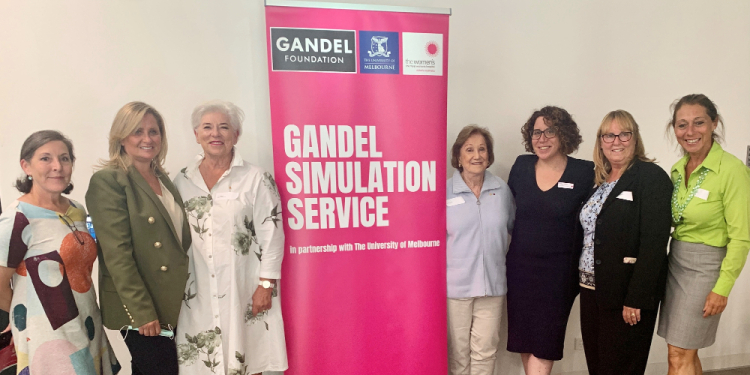
Two years after the introduction of the Gandel Simulation Service, colleagues and supporters gathered to mark the two-year birthday of this innovative program.
The Gandel Simulation Service was established at the Royal Women’s Hospital in late 2019 with funding from Gandel Foundation and The University of Melbourne Medical School.
Starting just as the pandemic was evolving, the service has played a significant role in pandemic preparedness, as well as maternity and newborn safety and women’s health across the Parkville Precinct and beyond.
Speaking at a celebration event held last month, Clinical Lead of Women’s Health Education, Simulation and the Gandel Simulation Service, Dr Rebecca Szabo, reflected on the program’s achievements.
“It is now two years almost to the day since we started, and we have been able to make real change at the hospital and help staff understand how to do their work better together,” said Dr Szabo.
The Gandel Simulation Service, in partnership with The University of Melbourne, is a translational simulation service delivering ‘in situ’ simulation within real clinical spaces with real teams. It uses simulation as a tool for quality improvement, to test clinical and operational processes and pathways, as well as for education and training. It includes all staff, both clinical and nonclinical, to ensure it is ‘work as done, not as imagined’.
This helps nurses, midwives, doctors, allied health professionals and administrative and support staff to collaborate. By having pathways and equipment tested prior to being used on real patients, they can practice skills and scenarios they may encounter in both clinical and non-clinical settings.
Gandel Foundation Director Lisa Thurin spoke about the long-standing partnership between the Women’s and the Gandel family and also the significant impact this project had on patient outcomes.
“Our relationship goes back more than 15 years, ever since we supported the establishment of the Pauline Gandel Imaging Centre. That has been a hugely successful project and we always wanted to build on that success, looking at opportunities to work with the Women’s on other important initiatives.
“The Gandel Simulation Service is one such initiative. As it developed, it became a vitally important part of the hospital’s COVID response. To realise that this project is not only helping train local medical staff and improve patient outcomes here in Melbourne, but that it is also helping train health professionals in other facilities, who will then be better prepared to help their patients, is any funder’s dream!
Understanding that there is such a powerful and tangible positive impact on patient outcomes is the best ‘return on investment’ we could have hoped for.”
The Women’s CEO, Professor Sue Matthews, praised all involved for their generosity and support.
“Gandel Foundation provided the philanthropic leadership by awarding a Flagship Grant to make this vision a reality. The Women’s has a long-standing relationship with the Gandel family and we are deeply honoured by our close association,” said Professor Matthews.
Research shows that translational simulation improves teamwork, patient outcomes, safety, culture and psychological safety. The Gandel Simulation Service embraces all these with culture and psychological safety at the core of its mission.
A comprehensive research and evaluation program is a key focus of the service. The team has partnered with translational simulation expert Professor Victoria Brazil and her team at Bond Translational Simulation Collaborative on ongoing research.
The Gandel Simulation Service team comprises Dr Rebecca Szabo, Nova Barrrios, Sarah Dick, Dr Kara Allen, Dr Marta Thio, Aishwarya Mohan, Dr Eve Purdy. You can read more on the Women’s website.